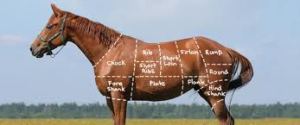It’s been firmly established that the only reason horse slaughter exist is for the love of money. No one, from the Church of Veterinarians, aka the AAEP, to the dust covered toothless hobo that hangs around the dumpster hunting for chicken parts, has been able to come up with a single, valid reason other than money.
That should come as a shock to all those who actually believed the hyperbolic propaganda put forth by those who wanted you to believe otherwise.There really is no reason to list the statements proponents have used. Each of them have been proven to be lies – complete and total fabrications put forth to convince the public that these wise men in white hats and bolo ties know best. Their souls have been lost as they manipulate others for their own selfish benefit while their pockets are stuffed with the blood money of dead horses.
I can’t be angry at them. More than anything, it’s sad beyond belief that such humans are so willing to leave behind whatever goodness was once in their hearts, as they take a sadistic, almost perverse satisfaction in spewing the wonders of horse slaughter. I can only hope that the realization of what they are doing happens before the day they lay on their death bed and face the inevitable question, “What have you done to make this world a better place?” to which they must answer, “I killed horses.”
It isn’t to them that I speak. This is to you, their faithful followers, who have long believed the lies, who shag along behind them, drawn by the siren’s song to repeat all that you have been told as though it was written in the Gospel, who truly believe that horse slaughter in the US is the foundation of our future, the corner stone for the Temple that will once again house all that is good and right.
Bear with me for a moment as we pause and think – what if it doesn’t happen? What if all the hopes and dreams of hauling your personal collection of unwanted horses to the horse slaughterhouse in some small Oklahoma town and walking away with a few hundred dollars just never comes true? What effect will that have on the agricultural business in the US? What horrible scenes of economic collapse do you envision?
Yes, those who depend on slaughter as the way to cull the poor results of their mass breeding programs will be
 screaming. The BLM, who often ponders about the joy of sending all their captured horses off to slaughter (oops, I mean “humane euthanasia.” Sorry.) will have a total breakdown. The racing industry might suddenly need to take responsibility for their animals. All of them will be horrified because they will be forced to change from the way its always been done.
screaming. The BLM, who often ponders about the joy of sending all their captured horses off to slaughter (oops, I mean “humane euthanasia.” Sorry.) will have a total breakdown. The racing industry might suddenly need to take responsibility for their animals. All of them will be horrified because they will be forced to change from the way its always been done.Whatever level of goodness still left in those industries is currently held by those who really want to do the right thing but are afraid of change, afraid of taking responsibility. People didn’t want to free the slaves because of the fear of change, didn’t want civil rights for all Americans, didn’t want to see this or that happen because…
“But what are we going to do with all the horses?”
Somehow the cotton got picked. Somehow Japan and Germany became our greatest economic partners. Somehow schools were integrated, blacks ate in restaurants, drank from the same water fountain. Somehow we pulled out of Vietnam and Southeast Asia didn’t plummet into the abyss of Communism. Somehow, today’s economy is recovering.
Somehow, when we do the right thing, we adopt to the change and the fear is replaced by the new normal. That new normal will be here soon and those who stand in the path of change are well advised to make plans for a new business model where horse slaughter is a thing of the past. The true leaders of the equine industry will be those who support long term care, limited and controlled breeding and owner responsibility.
Yes, it’s scary, but somehow that one percent of horses currently being slaughtered will no longer be a factor and the myth of “unwanted horses” will be a part of history.

No comments:
Post a Comment